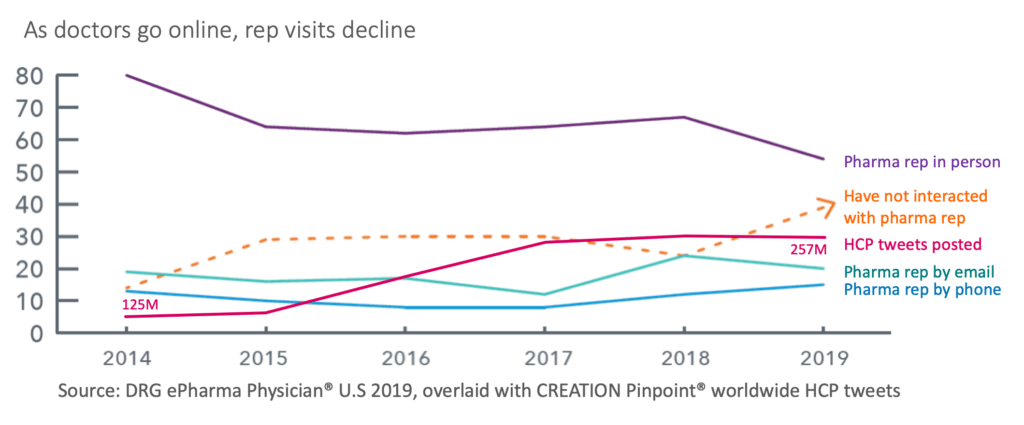Pharma transformation for the digital age
If you are a pharmaceutical business leader, that feeling you have had that healthcare professionals (HCPs) are disengaging with your company’s messages and reps is now official: the latest data on physician behaviour from Decision Resources Group (DRG) finds that pharma reps are increasingly being shut out of physicians’ offices, and pharmaceutical companies need to find new ways of reaching them.
If you have not yet seen DRG’s latest ePharma Physician and Taking the Pulse reports, I encourage you to get your hands on a copy and read them. The data provides compelling evidence that the relationship between the pharmaceutical industry and HCPs is desperately in need of transformation.
What is digital marketing in the pharmaceutical industry?
Digital marketing strategy in pharma involves using online technologies and platforms to better target their audience, healthcare professionals (HCPs). It is an alternative communication channel from traditional marketing channels as it can allow pharma brands to target HCPs wherever and whenever.
Why digital strategy for pharma companies is necessary
Physicians, the research shows, are more likely to go online for the information they need than to ask a pharma rep. In fact, half of the physicians responding to DRG’s research said they never had a question for a rep that they could not find answers for online.

It is not that doctors do not value the relationship with reps, according to Matt Arnold, Principal Analyst at DRG. “Docs are too pressed for time or restricted to see pharma reps, and going online is easy and intuitive,” he told me, “which suggests that remote rep contact could be viable, but so far we’re not seeing it, probably mainly because pharmas aren’t offering it.”
DRG’s report illustrates that digital content from reps is not replacing rep visits. Instead, doctors are finding answers for themselves, and maturing digital channels have enabled physicians to collaborate in new ways. DRG says that social platforms serve as forums for a robust exchange of clinical information and best practice, with the majority of US physicians using social media professionally.
Arnold says that pharmaceutical companies are not making up for lost in-person contact with remote rep contact, whether by email or any remote or digital channel. “In-person engagement with reps is plummeting and pharmas are so far failing to make up the difference with remote engagement,” he said.
DRG’s findings support research conducted by CREATION.co, which consistently reveals that HCPs are increasingly learning from their peers via public and private social media. On social media, HCPs talk about their concerns for patients; they ask each other for advice; and they respond to new data. CREATION.co’s analysis of more than 1.9M HCPs worldwide on public and private social media confirms that physicians are going elsewhere for the information they need, and shows that peer to peer engagement among HCPs in all settings continues to grow.
Is it too late for a digital pharma strategy?
There are signs that pharmaceutical companies are making progress with the digital resources they provide for HCP customers: according to DRG, 46% of physicians deemed pharma websites a credible source of information in 2019, versus just 27% in 2017.
“Increased credibility and recognition of value-adds indicates that pharmas are doing a better job diversifying their offerings online, and that doctors recognize that,” said Arnold. But can the industry really keep pace with changing customer needs?
DRG’s research shows that physicians highlighted limited time as the primary cause for less in-person time with pharma reps, with increased patient loads, EHR maintenance and time spent on other bureaucratic tasks resulting in less available time to meet with pharma reps. Indeed, DRG’s findings support CREATION.co research indicating an increasing mental health burden on HCPs. Therefore, digital strategy is a more convenient way for pharma brands to reach their target audience.
REPS INCREASINGLY STRUGGLE FOR FACE TIME WITH BUSY PHYSICIANS; PHARMAS HAVEN’T YET FOUND ALTERNATIVE WAYS OF ENGAGING WITH THEM
Source: DRG ePharma Physician US 2019
DRG says “Physician-pharma rep engagement has declined significantly in the past year”, it continues, “with in-person interaction, traditionally pharma’s main commercial lever, accounting for most of the drop”.
This is an urgent wake-up call for professionals in the pharmaceutical industry, many of whom sensed this shift coming but have been slow to change their traditional model, often blaming the complexity of pharmaceutical regulatory environment and data laws.
Many pharmaceutical companies are at last taking digital engagement seriously, with some making it a strategic imperative and installing senior leaders to lead what is often being referred to as “digital transformation”. Pfizer, for example, recently appointed a Chief Digital Officer, Lidia Fonseca, who the company says is responsible for “creating and implementing a strategy that accelerates and improves our digital capabilities so we can deliver more value to patients”. Sanofi followed Pfizer’s announcement with the appointment of Ameet Nathwani as its first Chief Digital Officer.
But is this all this too little, too late? Or, more than twenty years after the world was changed by e-commerce, will pharma ever recover its ability to engage its HCP customers?
I believe it can, and perhaps this change is ultimately for good. The digital age has empowered health stakeholders including doctors and patients to collaborate, share knowledge, and take learning into their own hands. They expect to find answers fast and easily; they filter out irrelevant content; and they look for answers among sources they trust.
“There are hints in the data that pharma is doing a better job of improving the online user experience and being a partner in care for physicians,” Arnold told me. “However, there’s still a vast gulf between the online experience offered and user expectations, shaped by more nimble, less regulated industries”.
How to redefine pharma-HCP relationships for the digital age
To succeed in physician engagement in the digital age, pharmaceutical companies must deal with each of these customer priorities: speed and ease; relevance; and trust.
The opportunity now is for pharma to truly serve its HCP customers, by learning what they really need and developing meaningful engagement based on a trusted relationship. There is a long way to go, but the answers are out there for pharmaceutical companies that seek to transform their own ways by embracing new thinking for the digital age.
The same collective intelligence that physicians turn to social media for – more than a billion online posts by their peers – is also available for pharma to learn from. With CREATION Pinpoint, healthcare companies, NGOs, policymakers, and HCPs are accessing a wealth of insight that enables them to learn how to engage physicians and serve them effectively.
Companies that are embracing the opportunity for meaningful physician engagement in the digital age are using CREATION.co’s tools to build trust with customers by understanding HCPs’ needs faster, responding more effectively, and engaging in a relevant way.
A new set of customer needs
The key is not to simply find a digital channel for the same old messages, but to understand that digital has already transformed customers’ work and lives, and to learn how to meet a new set of needs.
Take the traditional tactics of Key Opinion Leader (KOL) engagement, for example, which have been positively disrupted by the advent of the Digital Opinion Leader (DOL). But successful DOL engagement is not simply about transferring your KOL model to DOLs; in the digital age you need to understand DOLs, find vision alignment, build trust and develop new ways to partner.
Celgene, for example, partnered with DOLs in pancreatic cancer when it launched a tweet chat, #pancchat, which has gone on to play an incredible part in the ongoing online conversation about new practices in pancreatic cancer care.
Or consider the investment that pharmaceutical companies make in congress meetings, whether exhibiting or presenting data. The digital age has already transformed how physicians interact with information shared at congress. Companies that listen to HCP online activity during congress, learn from customer behavior and conversations, and are prepared to act with agility, have the opportunity to serve physicians in a tailored, meaningful way to truly add value to them. CREATION.co’s studies of HCP conversations during congress provide an instant view of physician reactions to data in a way never available before.
Beyond ‘digital transformation’
It is time, then, for the pharmaceutical industry to reframe its vision from ‘digital transformation’ to a more far-reaching approach of ‘transformation for the digital age’: embracing a new kind of relationship between doctor and pharma. In a world in which doctors are highly empowered by digital channels, pharma must look to serve them in a way that truly adds value. This is just one example of the kind of transformation that the digital age will ultimately bring to healthcare.
But time is of the essence, because, as data from DRG and CREATION.co confirms, pharma’s customers are not looking back. Those pharmaceutical companies who truly transform for the digital age have the opportunity to build a new kind of trusted relationship with HCPs, and it starts with listening to them.
- Declared interests: the author is CEO and founder of CREATION.co, a consultancy that works with healthcare companies and organizations to develop insights-led strategies by understanding the digital voice of HCPs.
- CREATION Pinpoint is a product and trademark of CREATION.co.
- ePharma Physician and Taking the Pulse are products of DRG. CREATION.co is not directly associated with DRG or Manhattan Research.
Frequently Asked Questions
What is a digital strategy in pharma?
A digital marketing strategy in the pharmaceutical industry is an opportunity for pharma brands to market their products through online and technological channels compared to traditional means.
Do pharmaceutical companies need to adopt digital marketing strategies?
More and more healthcare professionals use online platforms, so if pharma brands want to effectively reach their target audience, it is important they use these same channels.
 By Daniel Ghinn
By Daniel Ghinn 
